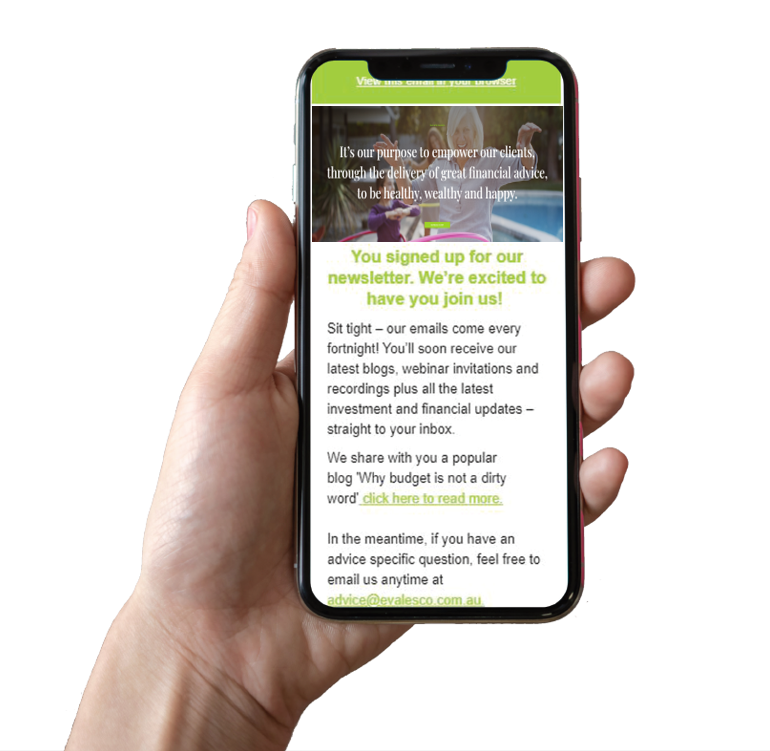
INSIGHTS WITH EVALESCO
TOPICS DISCUSSED
With the Coronavirus pandemic gripping the world at the moment, people have turned to headlines on the news and various social media platforms to stay up to date with life as we know it.
The world as we know it is going to end!! But we’re all still here, living a healthy, wealthy and happy life, right?
As individuals, can you control the Australian & world economies?
No
What about your own ‘personal economy’? As individuals, can you control that?
Yes
What is your ‘Personal Economy’?
Your personal economy includes your personal finances – income, assets, savings, debt – everything you have worked for. But it is so much more than all of these combined … it paints a bigger picture of how you spend your money and why.
Your individual personality, your priorities in life, your areas for improvement in life, as well as your financial needs and objectives – all of these come together to define what your own personal economy is all about.
Seeing as you can control your personal economy, how do you establish it? How can you then improve it? It’s important to still utilise the professional expertise of good quality financial advice, and we can help point you in the right direction with each of the following.
1. Know where you stand
With life seemingly ‘on hold’ at the moment, it’s a great opportunity to take the time you maybe wouldn’t have had before (commuting to work, socialising with friends) to understand your financial data and where it currently stands.
Some questions to ask yourself:
- Check your bank account(s), how much is in it/them? What is the purpose of the account(s)? How do you see them fitting in with your long-term goals and objectives in life?
- Have you noticed that your daily expenses have reduced as a result of isolation? The money saved on public transport, eating out or socialising … could that money be put toward paying off your credit card debt or home loan? How do you think your credit score is at the moment?
- It’s never a nice feeling to be made redundant or have your working arrangements changed. But what about your superannuation? Do you know how many accounts you have? A quick login to your MyGov account, along with your tax file number, under ‘Manage my super’ could lead you to a nice surprise.
2. Get organised
A valuable piece of advice my father gave me, “Son, if you fail to plan, you plan to fail”. Planning, goal-setting, and organisation are essential to not only improve your finances in the short-term but to set you up for long-term success.
Set yourself goals that are ‘SMART’:
- Specific
- Measurable
- Achievable
- Realistic
- Time-bounded
Once you have these SMART goals in place, put key dates on the calendar, reminders in your phone – anything to keep you focused in achieving these goals.
Most importantly … remember to celebrate the wins. Like with anything in life, accomplishing a goal can provide you immense satisfaction and pride, and knowing you had great help and support along the way makes the accomplishment all the more satisfying.
3. Stay focused, stay busy
The most important tool for improving your finances is budgeting. Schedule time every week to look at your accounts, upcoming payments, and expected income and to create a budget that meets your needs. Now is a great time to prioritise your personal finance time like you would work, school, or any other obligation.
While we are all in self-isolation, it’s also a fantastic time to practice self-discipline in all aspects of your life – getting used to cooking meals at home instead of going out. Have you exhausted the Netflix catalogue, and don’t see the need for paying for it? You might wish to pass the time by reading a book.
4. Get smart
Congratulations! You have successfully created a budget that is easy to stick to, easy to monitor, and works for you, your lifestyle and your goals. You know where you stand, you have goals and objectives, and are completely focused on them.
What’s next?
Let’s consider taking a deeper dive into the world of personal economy.
Books, articles, seminars, and online courses are all great ways to increase your knowledge about finance, economics, time-management, and goal-setting. The time spent crammed on a train in the morning and evening commute could be used to read books about budgeting or forming healthy habits.
With all this additional time saved spent in isolation, what about ‘that course’ you thought about doing?
It’s a great time to focus some of your energy on learning and improving your skills. Accomplishment is a great feeling when times feel tough.
5. Pay, save and invest
The final step to improving your personal economy is to pay, save, and invest. It’s important to make sure you plan for long-term stability, first.
Always start off by managing debt. Credit card debt, mortgages, personal loans … these are just a few of the many things that can put us in the red. If you are spending less on expenses currently, there is an opportunity to focus on paying off debt at a reasonable pace and on time while maintaining a savings balance.
Ask yourself, “how is my savings balance looking at the moment?”. There are a multitude of options available to you and your money, so that it can work as hard as possible for you. As you already know ‘the purpose of your accounts’, is the administration vehicle they’re in going to be able to help you achieve this purpose?
Above all, make sure you think your investments through and always maintain a financial safety net.
Improving your financial wellbeing can be a lengthy and daunting process. However, with good planning and support, self-discipline, and budgeting, boosting your personal economy is within reach.
SHARE OUR INSIGHTS
Share on Facebook
Share on Email
Share on Linkedin

NEWSLETTER
Sign up to get the latest insights with our newsletter delivered straight to your inbox
Award Winning Financial Planners and Advisers As Seen In

Evalesco Financial Services Level 17, 20 Bond Street Sydney NSW 2000
Phone: (02) 9232 6800
The information provided on and made available through this website does not constitute financial product advice. The information is of a general nature only and does not take into account your individual objectives, financial situation or needs. It should not be used, relied upon, or treated as a substitute for specific professional advice. We recommend that you obtain your own independent professional advice before making any decision in relation to your particular requirements or circumstances. Evalesco Financial Services do not warrant the accuracy, completeness or currency of the information provided on and made available through this website. Past performance of any product discussed on this website is not indicative of future performance. Copyright © 2019 Evalesco Financial Services. All rights reserved


